Donor appreciation event
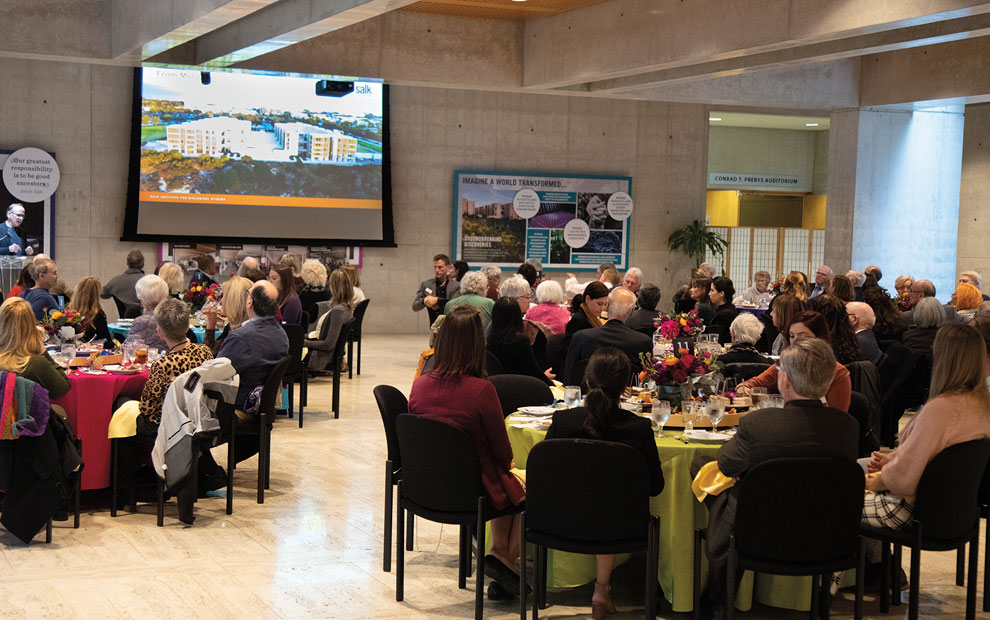

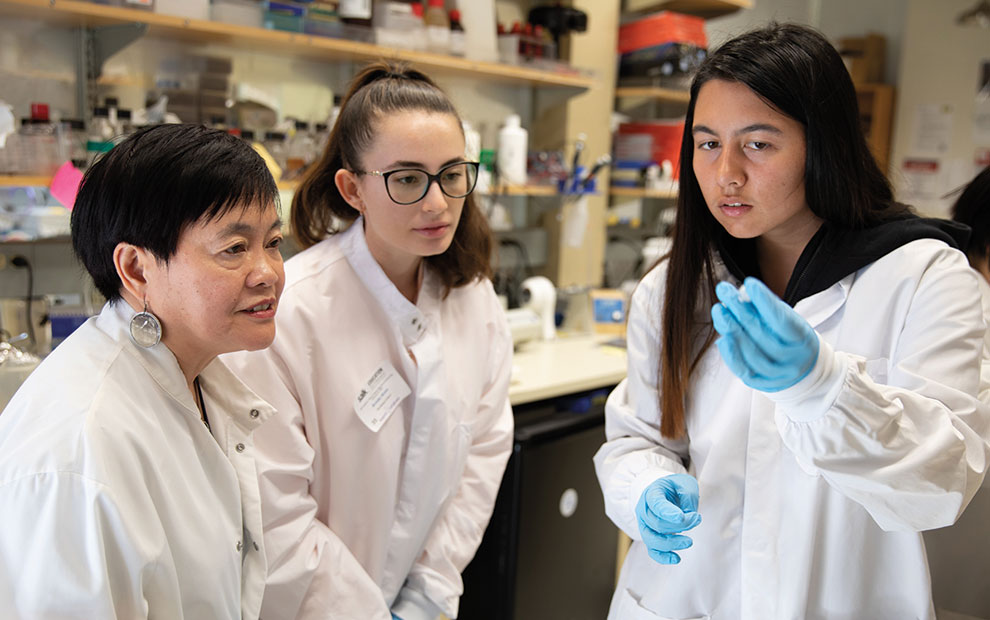
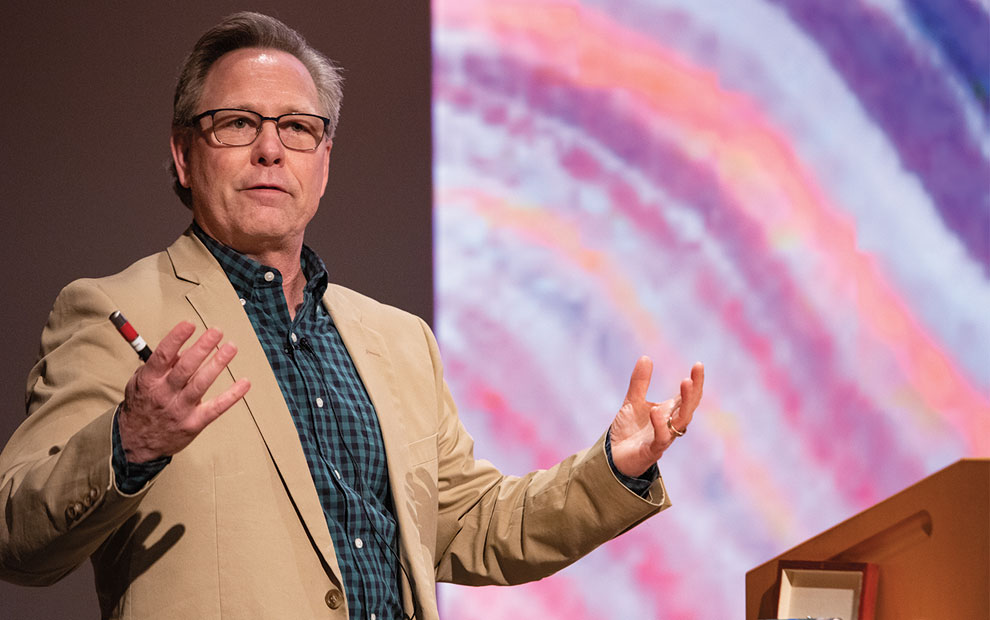
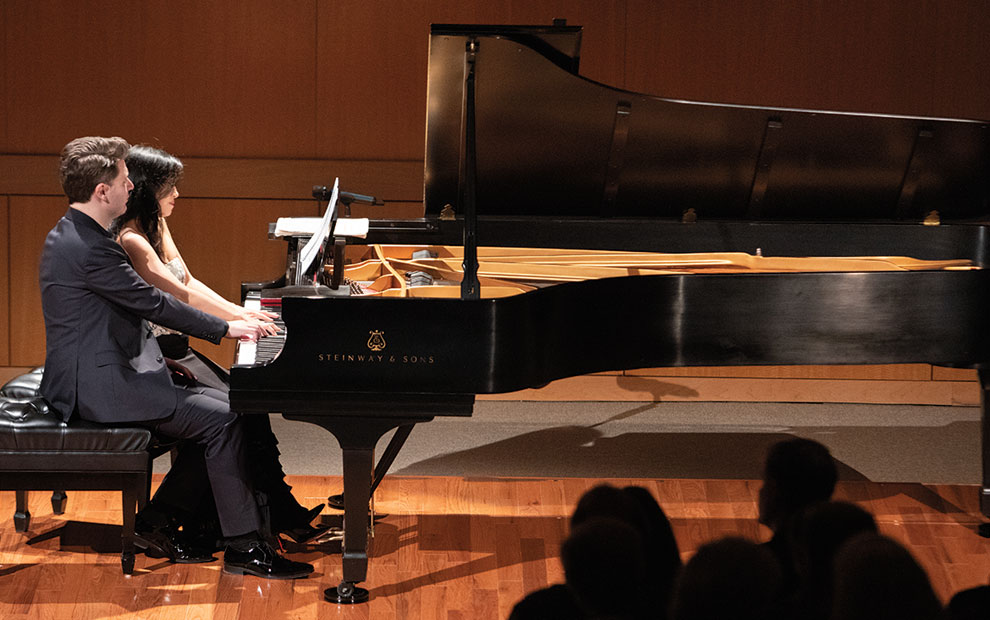
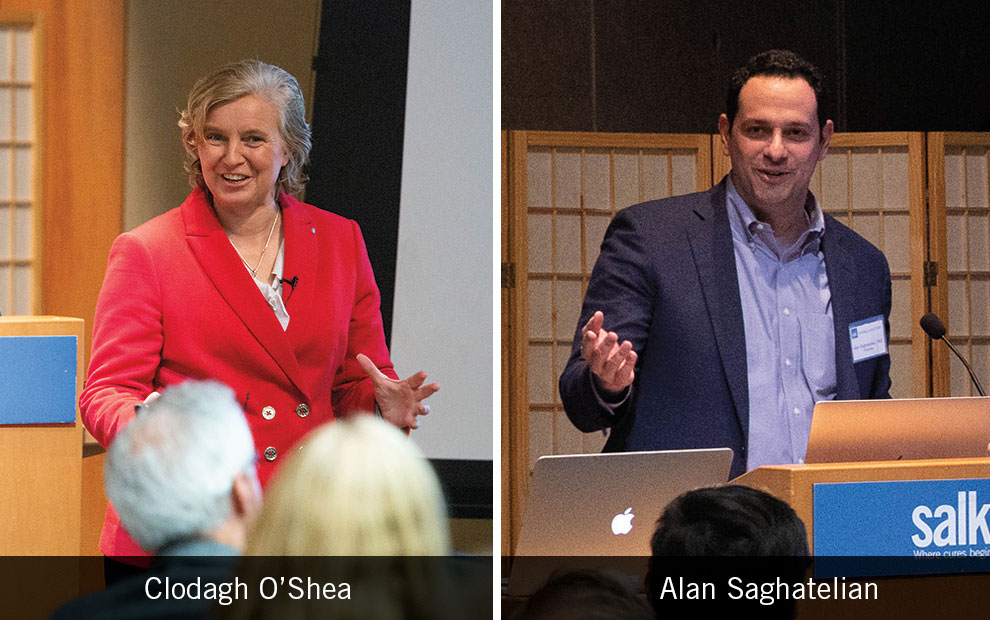
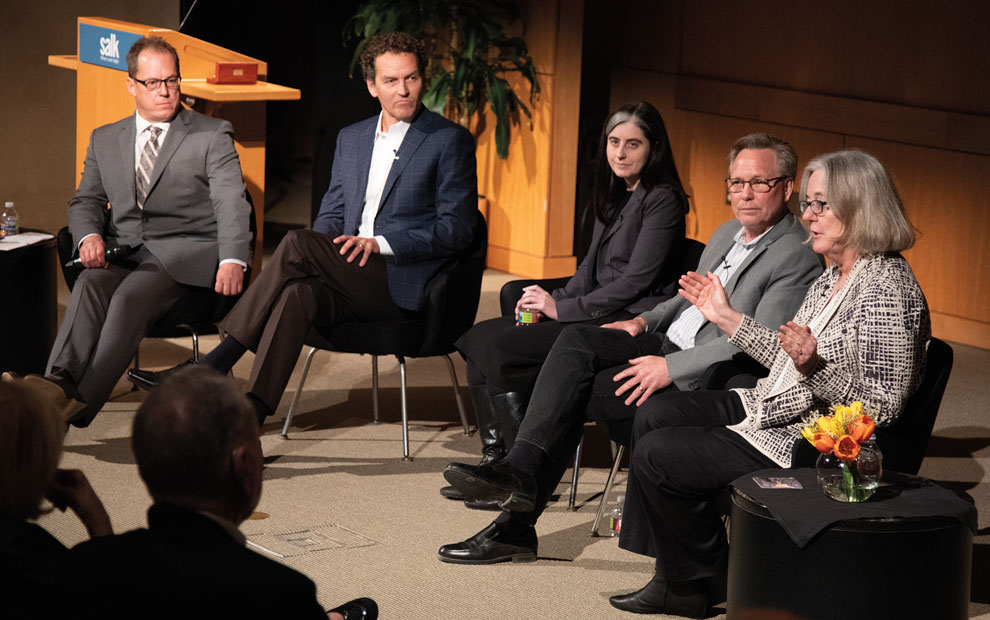
On November 14, the Salk Institute introduced its Optimizing Aging Initiative.
Aging is the biggest risk factor for most diseases, including Alzheimer’s, cancer, diabetes and others. The new initiative uses a multidisciplinary approach to understand the fundamentals of aging and how interactions between the major systems of the body contribute to age-related diseases.
The event featured a guest presentation from Mark Collins, president of the Glenn Foundation for Medical Research, an overview of the Initiative by Salk President Rusty Gage, and a panel discussion with Salk scientists Professor and Chief Science Officer/Vice President Martin Hetzer; Professors Jan Karlseder, Vicki Lundblad and Gerald Shadel; and Associate Professor Nicola Allen.
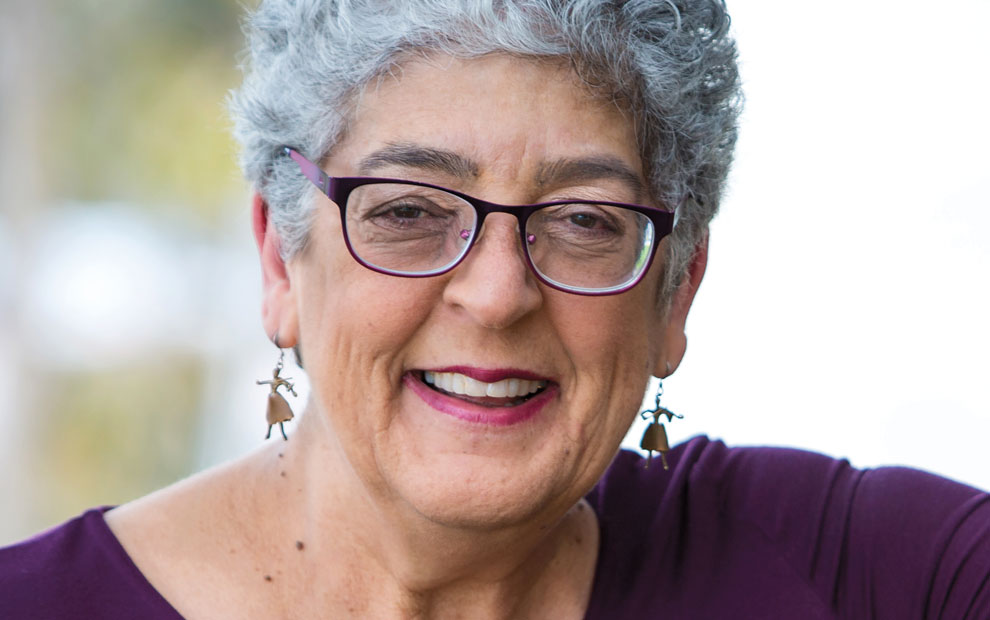
Professor Joanne Chory was honored with the Trailblazer Award from Salk Women & Science. The award recognizes outstanding achievements made by women in the STEAM (Science, Technology, Engineering, Art and Mathematics) fields. Recipients have pioneered changes within the STEAM fields as innovators, groundbreakers, collaborators and mentors. They have dedicated their lives to making significant advances in both their professional and personal realms. Trailblazers forge their own paths to achieve their vision.
Chory’s efforts leading Salk’s Plant Molecular and Cellular Biology Laboratory, in addition to her roles as a professor, a Howard Hughes Medical Institute investigator, and the Howard H. and Maryam R. Newman Chair in Plant Biology, have been widely acclaimed. She was awarded the 2018 Breakthrough Prize in Life Sciences and was made a Fellow of the National Academy of Inventors. Her work leading Salk’s Harnessing Plants Initiative, which focuses on creating plants that store more carbon in their root networks to help mitigate the effects of climate change, was instrumental in the Institute being chosen in 2019 for funding of more than $35 million through The Audacious Project, a highly competitive program housed at TED.

While a public event lauding the Women & Science recipients was not possible this year, the Institute is proud to share and celebrate their achievements. Every year, the program provides crucial support to graduate students and postdoctoral researchers to pursue high-risk, high-reward research in stages too early to attract traditional funding. The awards are targeted toward supporting future scientific leaders who will also actively foster the increased participation of women and girls in science.
BIANCA BARRIGA | PFAFF LAB
Investigating effects of exercise training on spinal neural networks
Barriga will examine the neurons within the mouse spinal cord that help produce movements—such as walking and running—to better understand what separates the ordinary athlete from runners such as Florence Griffith Joyner, the fastest woman in the world.
YOUTONG HUANG, PHD | LEMKE LAB
Microglial TAM receptors as modulators of pathology in amyotrophic lateral sclerosis
Brain and spinal immune cells called microglia are thought to play a crucial role in the development of amyotrophic lateral sclerosis (ALS). Huang will use various techniques to assess the impact of proteins called TAM receptors found on microglia, on ALS disease progression.
ANDREEA MANOLE, PHD | GAGE LAB
Neuroinflammation associated with genetic defects in phospholipase A(2) and glucocerebrosidase
Manole will use induced pluripotent stem cells derived from patients with mutations in two genes involved in fat metabolism (PLA2G6 and GBA) to study metabolism and neuroinflammation in the context of neurodegeneration, which could lead to improved therapeutic strategies for diseases.
HEATHER MCGEE, MD, PHD | KAECH LAB
Investigating the role of radiation-induced innate immune cell activation in unique tumor microenvironments
There is limited scientific data characterizing the immune response to radiation therapy for cancer. McGee will investigate radiation-induced cell death to see if it triggers the immune response, leading to anti-tumor immunity and the formation of scar tissue.
HSIUYI CHEN, PHD | MCVICKER LAB
Generating HIV-resistant human CD4+ T cells by introducing thousands of chimpanzee alleles with massively-parallel genome editing
The chimpanzee and human genomes are extremely similar, yet chimps are more resistant to developing AIDS after HIV infection. Chen will examine the genetic differences between the two species that confer resistance to HIV, to develop HIV-resistant human T cells.
SEJ CHUNG, PHD | ENGLE LAB
Defining the role of CA19-9 in the pancreatic microbiome
Chung will investigate how levels of CA19-9, a sugar molecule associated with one of the deadliest cancers—pancreatic cancer—affects gut bacteria populations. The work could reveal biomarkers for early detection and possible therapeutic targets for pancreatic tumors.
SHARON (HSIANG-HSUAN) HUANG, MD | JIN LAB
Dissecting the role of sensorimotor feedback in action sequencing
Huang will investigate how the brain integrates feedback to control behavior, which will shed light on neurological and psychiatric diseases, such as schizophrenia, that involve difficulty controlling actions.
JIA NING, PHD | HUNTER LAB
Establishing cell and mouse models to study RNA polymerase III-related neurodegenerative diseases
Mutations in the enzyme RNA polymerase III cause diseases such as hypomyelinating leukodystrophy (HMLD), an early onset neurodegenerative disease. To inform new therapies for this disease, Ning will use genetic models and patient-derived neural stem cells to investigate the mechanism of RNA polymerase III.
ANNELISE SNYDER, PHD | KAECH LAB
Determining the role of microglial metabolic reprogramming in linking infection to Alzheimer’s disease
Alzheimer’s disease is associated with previous viral infections, although researchers do not understand precisely how. Synder will examine how viral infections may reprogram how brain-resident immune cells, called microglia, use energy sources in a way that promotes the development of disease.
YUAN XUE, PHD | IZPISUA BELMONTE LAB
Creating biocompatible electric organoids for the mammalian system
Xue will draw inspiration from electric rays and eels to create specialized organoids (“mini organs”) that can generate their own electrical signal, for biotherapeutic uses—such as generating sufficient power to run a cardiac pacemaker.
 Apart but togetherAs COVID-19 spreads across the world, organizations like the Salk Institute have mobilized to respond. In this feature article, read about how the Institute is adapting and continuing its groundbreaking science.
Apart but togetherAs COVID-19 spreads across the world, organizations like the Salk Institute have mobilized to respond. In this feature article, read about how the Institute is adapting and continuing its groundbreaking science.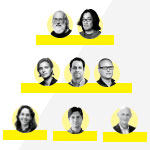 New COVID-19 research projectsIn addition to Salk’s ongoing research areas relevant to COVID-19, several new coronavirus-specific projects have recently launched. These innovative projects range from understanding the structure of the virus to mobilizing the body’s immune reaction.
New COVID-19 research projectsIn addition to Salk’s ongoing research areas relevant to COVID-19, several new coronavirus-specific projects have recently launched. These innovative projects range from understanding the structure of the virus to mobilizing the body’s immune reaction.
 A conversation with Martin HetzerIn the last few months, Salk Vice President and Chief Science Officer Martin Hetzer spearheaded the Institute’s efforts to respond to the pandemic from both an administrative as well as a scientific perspective.
A conversation with Martin HetzerIn the last few months, Salk Vice President and Chief Science Officer Martin Hetzer spearheaded the Institute’s efforts to respond to the pandemic from both an administrative as well as a scientific perspective.
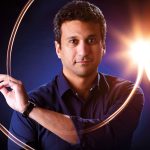 Eiman Azim – Decoding dexterityIn this Q&A, Assistant Professor Eiman Azim shares his thoughts on what’s next in neuroscience, how all scientists are philosophers and what he learned about movement from observing his newborn.
Eiman Azim – Decoding dexterityIn this Q&A, Assistant Professor Eiman Azim shares his thoughts on what’s next in neuroscience, how all scientists are philosophers and what he learned about movement from observing his newborn.
 Nasun Hah – Next gen sequencingAs the director of the Next Generation Sequencing Core, Staff Scientist Nasun Hah collaborates with everyone from plant biologists to neuroscientists to provide support and information about sequencing genes and entire genomes.
Nasun Hah – Next gen sequencingAs the director of the Next Generation Sequencing Core, Staff Scientist Nasun Hah collaborates with everyone from plant biologists to neuroscientists to provide support and information about sequencing genes and entire genomes. Update on initiatives to support diversity and BIPOCLearn about the Institute’s commitment to and actions around diversity and inclusion.
Update on initiatives to support diversity and BIPOCLearn about the Institute’s commitment to and actions around diversity and inclusion.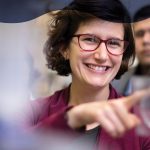 Molly MattyMolly Matty, a postdoctoral researcher in the lab of Associate Professor Shrek Chalasani, shares what worms can teach us about human behavior, why science outreach is so important and why she enjoys puns.
Molly MattyMolly Matty, a postdoctoral researcher in the lab of Associate Professor Shrek Chalasani, shares what worms can teach us about human behavior, why science outreach is so important and why she enjoys puns.Latest discoveries, events & more.